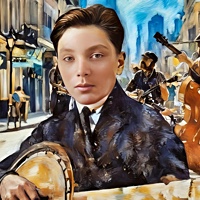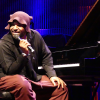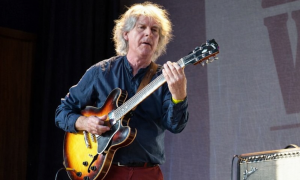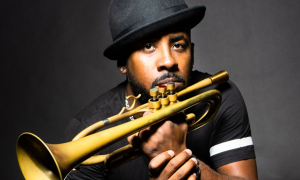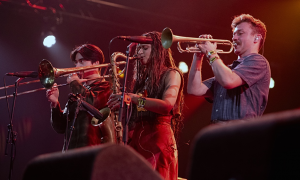Home » Jazz Articles » Live Review » Charles Lloyd and Branford Marsalis at The Blue Note Jazz Festival
Charles Lloyd and Branford Marsalis at The Blue Note Jazz Festival
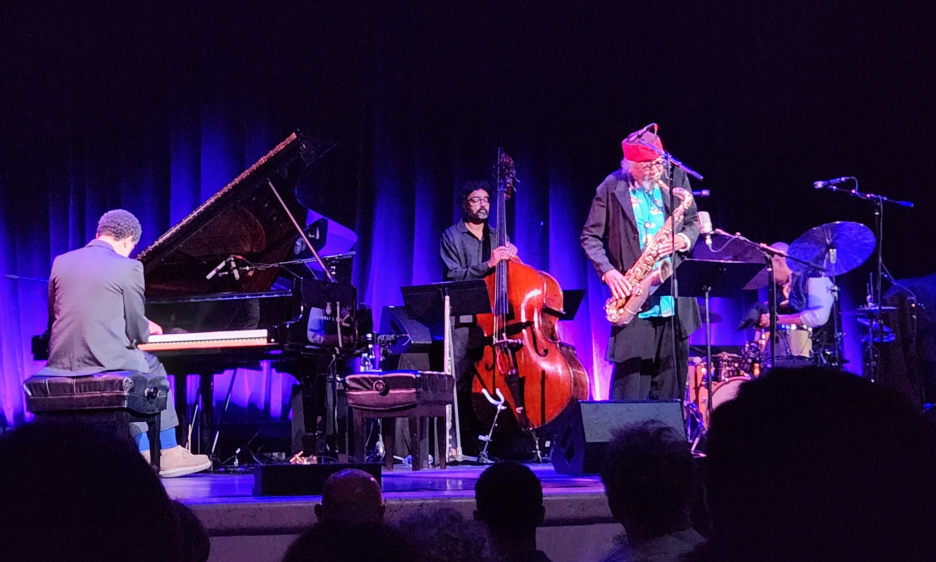
In successive sets by their classic quartet lineups, Lloyd and Marsalis demonstrated striking contrasts in tone and feeling.
Town Hall
The Blue Note Jazz Festival
New York City
June 28, 2025
Both Charles Lloyd and Branford Marsalis are saxophonists who lead classic quartets and share a similar position slightly left of center within the jazz world—comfortable with hopping genres but grounded in tradition. Yet their sets at a double bill at The Town Hall were strikingly different in tone and feeling.
Opening the evening, Lloyd quickly established the set's warm aura and generally spare aesthetic with a touching take on The Beach Boys ballad "God Only Knows." This emotive and unadorned arrangement, with only pianist Jason Moran in accompaniment, was first recorded by the two on Hagar's Song, their 2013 duet album, and was revived Friday in presumed tribute to the song's writer, Brian Wilson, who died earlier in June.
Even after the rhythm section—Harish Raghavan on bass, and Eric Harland on drums—joined in, Lloyd and the pianist remained the simpatico heart of the band, serving almost as co-leaders. Moran's solos occasionally built to dynamic peaks—including one of his extended rumbling walls of sound, like the one that startled at a Jason Moran at The Apollo Theater concert earlier in the year. Yet he mostly supported Lloyd's characteristically thoughtful and searching solos with careful and delicate accompaniment. His own excursions leaned to the spacious and uncrowded.
The bond between the two even extended to the spatial. Frequently, during Moran's solos, Lloyd stood near the piano, his face looking blissful and his arms moving in a loose-limbed and joyful sashaying. At one point, between selections, Lloyd gave Moran's back an affectionate rub—a sweet, fatherly gesture from a leader who's a generation older than his frequent pianist.
Lloyd's soft shoe conjures up the adorable side-stage swaying during colleagues' solos of another saxophonist—and fellow recipient of universal acclaim: Joe Lovano. Like the younger Lovano—who's a mere 72, to Lloyd's astonishingly spry 87—Lloyd's playing exudes intelligence without being cerebral, and quiet passion without being over-sentimental.
Raghavan and Harland sensitively adapted to the calm, near-spiritual vibe of the set, The several extended bass solos were deeply felt, unflashy affairs. When Harland took a three-minute unaccompanied solo towards the middle of the set, he commanded attention through what he left out, including full-set fills and much in the way of cymbal crashes. Mostly playing a snare, single tom and cymbal, and the kick drum, Harland's excursion was more a subtle rumble than a loud tour-de-force.
The Lloyd performance was akin to a warm and thoughtful—though never dull—living-room conversation, led by a charismatic (and slightly shamanistic) host. By contrast, Marsalis's set was more like a lively house party out on the porch, with voices and spirits elevated in brash excitement.
With nervy bravado, the Marsalis segment entirely comprised selections from a single album that was neither an older work of his nor an acknowledged classic, such as his previous full-album tribute A Love Supreme -Live in Amsterdam.
Instead, the saxophonist performed in full Belonging, his 2024 re-recording of Keith Jarrett's album. Released in 1974 on ECM Records, "Belonging" was Jarrett's first recording with his so-called European quartet. The album's generally high energy level belied that band's reputation as more dynamically restrained than the pianist's muscular all-star American ensemble of Charlie Haden, Dewey Redman, and Paul Motian. But the European quartet did burn with a cooler emotional flame, thanks in large part to the icily pure playing of Norwegian saxophonist Jan Garbarek.
Correspondingly, Marsalis's playing at The Town Hall was as precise and exuberant as ever, but less loose and emotive than on some of his albums, including such blues excursions as I Heard You Twice The First Time. The Marsalis version of "Belonging" hewed fairly closely to the original version, even as it stretched out a little more—perhaps because it was unconstrained by the time limits for optimal sound quality on vinyl that Jarrett and producer Manfred Eicher would have faced in 1974.
And just as Lloyd in his set gave a lot of solo time to Jason Moran, Marsalis often ceded the spotlight to pianist Joey Calderazzo, who often spun out solos as dense and extroverted as Moran's were spare and pensive. The rhythm section—of Eric Revis on bass, Justin Faulkner on drums—was also turbocharged for much of the set. A late-set solo, over accompaniment, by Faulkner during "The Windup"— an adrenaline-rush earworm of a composition—was the antithesis of Harland's excursion with Lloyd. Faulkner cannonaded around the kit with marching band intensity, detonating thunder fills that elicited whoops from band and audience alike.
The solos—and the sets as a whole—excelled in ways that encompassed what a horn, piano, bass and drums can do in modern jazz. Kudos to the Blue Note Jazz Festival for booking such a compelling and contrasting double bill.
Tags
Live Review
charles lloyd
Paul Reynolds
Sacks and Co.
United States
New York
New York City
Branford Marsalis
The Town Hall
The Beach Boys
jason moran
Hagar's Song
Brian Wilson
Harish Raghavan
Eric Harland
Jason Moran at The Apollo Theater
joe lovano
A Love Supreme -Live in Amsterdam
Belonging
ECM Records
Charlie Haden
Dewey Redman
Paul Motian
Jan Garbarek
I Heard You Twice The First Time
Manfred Eicher
Joey Calderazzo
Eric Revis
Justin Faulkner
Blue Note Jazz Festival
PREVIOUS / NEXT
Charles Lloyd Concerts
Support All About Jazz
 All About Jazz has been a pillar of jazz since 1995, championing it as an art form and, more importantly, supporting the musicians who make it. Our enduring commitment has made "AAJ" one of the most culturally important websites of its kind, read by hundreds of thousands of fans, musicians and industry figures every month.
All About Jazz has been a pillar of jazz since 1995, championing it as an art form and, more importantly, supporting the musicians who make it. Our enduring commitment has made "AAJ" one of the most culturally important websites of its kind, read by hundreds of thousands of fans, musicians and industry figures every month.



